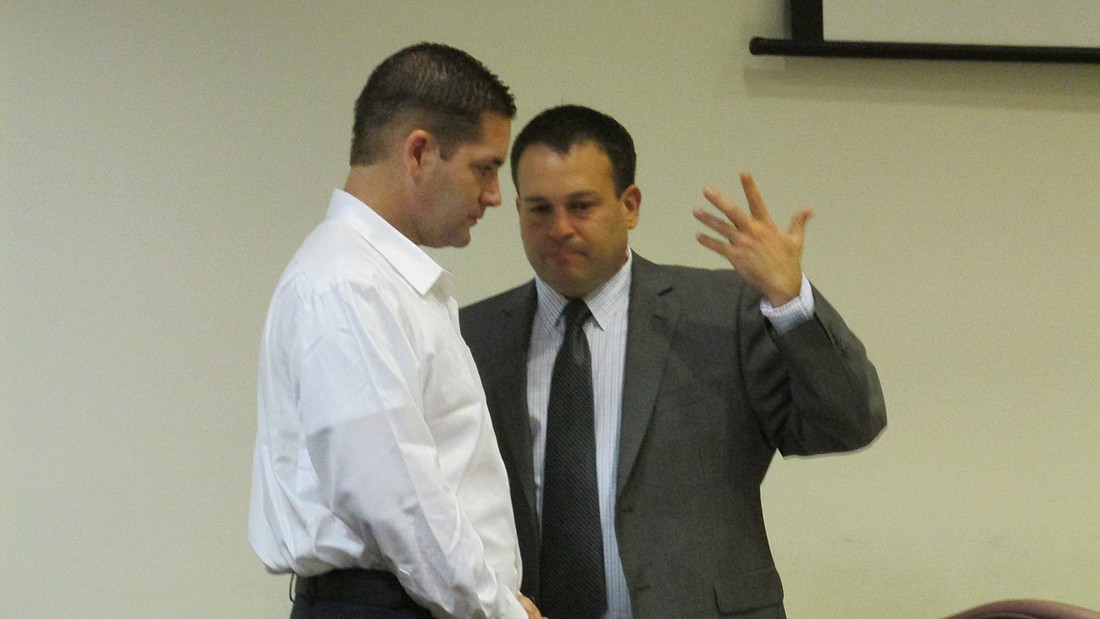- May 4, 2024
-
-
Loading

Loading

Lonnie Redner said he went to his friends’ house at about 11 a.m. on Nov. 13, 2009, to buy drugs. Nobody answered his knocks, but he could hear the phone ringing. He figured he’d caught them asleep, so he decided to play a prank.
He pounded on the door again.
“Police,” he said. “Open up!”
He opened the door, and that’s when the smell hit him.
“It hit me like hot air, so I stepped back out,” Redner said while testifying in court, his face contorted with emotion while he held back tears. “Man, I knew as soon as I opened the door there was no way there could be anything alive in there.”
But Redner said he was dopesick; he needed drugs. His addiction had escalated to the point where drug use was as necessary as breathing. So he went inside and scooped up the pills that were scattered around Mike Floyd and Andrew Kakowski’s living room. He also took a gun from the scene.
He didn’t call the police because he didn’t want to get in trouble, he said. When investigators asked him if he knew anything about the men’s deaths, he lied because he was ashamed of how far his life had fallen — that he had stolen from his two dead friends. It was only when he was charged with their murder that he began to tell the truth, he said.
Redner faces two charges of first-degree murder and one charge of armed robbery in a trial that began Monday. Prosecutors painted him as a man desperate enough for drugs that he was willing to kill.
But when Redner’s defense attorney, Bradley Sherman, began his case on Thursday, he told a different story. Sherman argued that the case is not a double homicide as prosecutors allege, but instead, a murder-suicide.
Sherman called forensic consultant Michael Knox to testify; he said he could not definitively rule the case double homicide or murder-suicide, but that several pieces of physical evidence point to the latter.
For one, Knox said, an indentation on Kakowski’s right index finger, as well as the way his right hand was positioned when his body was found, suggest he could have fired a gun right before he died.
Kakowski was found lying on the floor, his right arm curved up toward his temple and his left arm extended above his head. Knox said that this means Kakowski was in this position when he died. Had Kakowski been standing, Knox said, his arms would have fallen with the rest of his body and would not have landed that way.
Kakowski was shot at the top, back of his head. There was a blood spatter on Knox’s left, inside elbow, also suggesting that he was lying flat when he was shot.
Sherman asked whether there was a possibility that Kakowski was shot by another person.
“The way it would have to be accomplished is that the person would have to bend down, hold the firearm almost roughly parallel to the floor and, given the location of where the cartridge ended up — which is in the bathroom — the pistol would have had to be rotated,” Knox said.
He noted that the tassels on the rug where Kakowski was found were undisturbed, and none of the furniture was moved, indicating that there was not a struggle.
However, a medical examiner ruled Kakowski’s death a homicide.
During cross-examination of Redner, prosecutor J. Ryan Will questioned Redner’s credibility, pointing out the numerous times Redner lied to investigators after the bodies were found. At one time, detectives came to speak with Redner, but he hid in a closet and asked his girlfriend to say he wasn’t home. His roommates saw him burning his clothes around the time the two men died, which Redner said was because he’d stumbled across the bodies and was worried he would be connected to the crime scene.
Prosecutors filed an affidavit announcing they will not seek the death penalty, though first-degree murder is a capital felony in Florida. At press time, the defense was still finishing its case. Then, a judge will hand it to the jury, who has remained largely emotionless during the tear-laden trial.
If convicted, Redner faces up to life in prison.